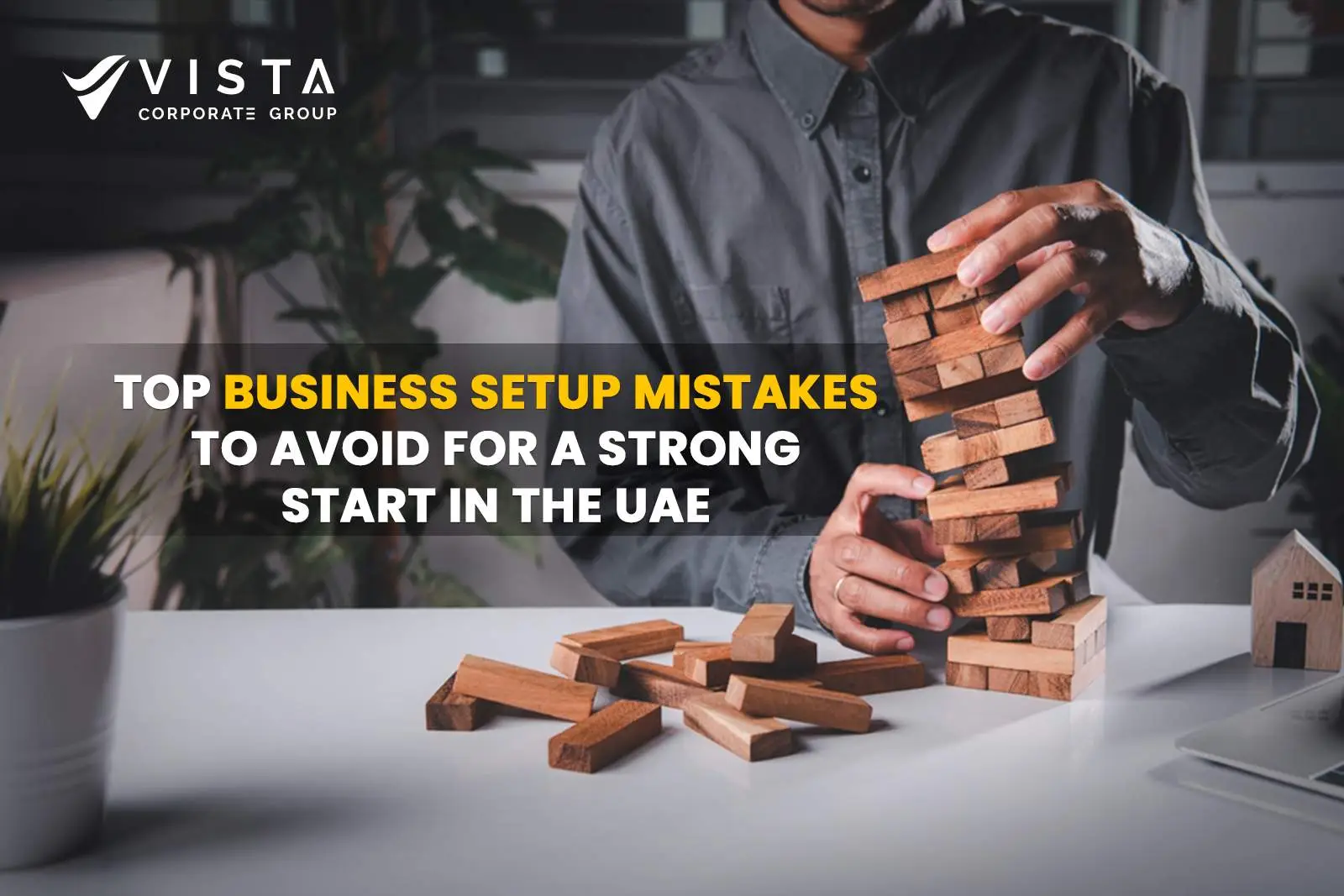
When it comes to launching a business in the UAE, there’s more than just a golden opportunity awaiting—there’s a roadmap of strategies, rules and decisions that can determine your success in one of the world’s fastest-growing economies. With competitive tax benefits, a dynamic market and an increasingly globalised environment, the UAE has attracted a mix of ambitious startups and established companies looking to scale. Yet, while it’s tempting to dive into such a vibrant business landscape, there are critical pitfalls that can catch even the most experienced entrepreneurs off guard.
From navigating a unique regulatory system to choosing the right business structure, these early decisions can make or break your business. In this blog, we’ll explore some of the common mistakes businesses make in the UAE—mistakes you can avoid with the right insights and guidance.
1. Lack of Proper Research and Planning
Setting up a business in the UAE without thorough research and strategic planning is like launching a ship without a map—it’s not just daring, it’s risky. In a competitive environment like the UAE, where industries are booming, but market dynamics constantly shift, proper research and preparation form the backbone of a successful business launch. This preparation involves more than just understanding consumer trends; it’s about grasping the nuances of each sector, from technology and finance to tourism and real estate, so you can position your business with clarity and strength.
One of the biggest hurdles for new entrepreneurs is understanding the ever-changing market landscape. The UAE’s economy, while thriving, is subject to global shifts, from economic cycles to changing trade regulations, which can impact demand and market stability. Without a clear analysis of market conditions, competitive forces and consumer preferences, businesses can find themselves caught off guard by shifts they didn’t anticipate.
Equally important is navigating the UAE’s regulatory framework. While the UAE’s business-friendly policies—like favourable tax structures and streamlined processes—are a major draw, they come with specific regulatory expectations. Missteps in understanding these requirements can lead to costly delays, fines, or even legal issues. Taking time to understand licensing requirements, industry-specific regulations and the overall business ecosystem is crucial to staying compliant and operational.
2. Choosing The Wrong Jurisdiction and Business Structure
Selecting the right jurisdiction and business structure in the UAE is not just a formality; it’s a crucial decision that significantly impacts your company’s operational flexibility, tax obligations and growth potential. With a range of options available, including Free Zones, Mainland jurisdictions, Limited Liability Companies (LLCs) and Sole Proprietorships, understanding the differences is essential to making an informed choice.
Jurisdictions: Dubai offers two primary jurisdictions: Free Zones and Mainland. Free Zone company formation appeals to foreign investors, allowing for 100% ownership, tax exemptions, and streamlined administrative processes. These areas are ideal for businesses focused on international trade or service sectors. However, Free Zone companies face limitations when conducting business directly within the UAE mainland, which can restrict their market reach.
In contrast, the Mainland jurisdiction provides businesses with the freedom to trade throughout the UAE, accessing local markets and government contracts without the restrictions that come with Free Zones. While some Mainland business setups may require a local sponsor or partner, they offer greater opportunities for growth and operational flexibility.

Business Structures: Within freezone and mainland jurisdictions, entrepreneurs can choose from various business structures, such as Limited Liability Companies (LLCs) and Sole Proprietorships. LLCs are popular for joint ventures and small to medium enterprises, offering liability protection while allowing partners to share profits. This structure limits individual liability, making it a safe choice for many business owners.
Sole Proprietorships, on the other hand, provide full control to the owner but come with unlimited liability, meaning the owner is personally responsible for all business debts and obligations. This structure can be suitable for freelancers or small business owners but requires careful consideration of risk.
Choosing the right jurisdiction and business structure involves evaluating factors like your target market, growth projections and risk tolerance. Partnering with experts like Vista Business Setup can guide you through the company formation complexities, ensuring your decisions align with your business objectives while keeping you compliant with local regulations.
3. Choosing The Wrong Business Activity and License
Selecting the appropriate business activity and obtaining the correct license is one of the most critical decisions entrepreneurs face when establishing a venture in the UAE. This choice closely follows the decision of which jurisdiction to operate in. Each jurisdiction permits specific business activities, and understanding these nuances is vital to avoid costly mistakes.
While it may seem straightforward, the process of selecting a business activity is more complex than it appears. Entrepreneurs must ensure that the business activity aligns perfectly with the license they apply for. The UAE offers over 2,000 types of business activities, each requiring a corresponding license. If a business chooses the wrong activity, it will likely face the inconvenience of having to amend its license, which can be a time-consuming and expensive process.
More importantly, failing to align your business activity with the correct license can lead to severe repercussions, including disruptions in operations and potential penalties from regulatory authorities. To avoid these pitfalls, it’s crucial to conduct thorough research and consult with experts who can guide you through the licensing process.
4. Ignoring Legal and Regulatory Compliance
The UAE’s regulatory landscape is intricate and characterised by a multitude of laws and regulations that govern various aspects of business operations. For entrepreneurs, understanding and adhering to these requirements is not just advisable—it’s essential for ensuring the smooth and lawful operation of their ventures.
From company registration and licensing to labour laws, immigration regulations, and tax compliance, the path to business success in Dubai requires careful navigation through a complex framework. Each of these elements comes with specific obligations that must be met. For instance, failing to obtain the proper licenses can halt operations, while non-compliance with labour laws can lead to disputes, fines, or reputational damage.
Additionally, understanding immigration regulations is crucial, especially for businesses planning to hire expatriates. The UAE has stringent visa and employment rules that, if ignored, could result in penalties ranging from fines to the deportation of personnel. Tax compliance is another area where entrepreneurs must be vigilant, as the UAE has specific regulations regarding VAT and corporate taxes that need to be followed closely.
The repercussions of ignoring these legal obligations can be severe. Businesses may face hefty fines, legal sanctions, or even the suspension of their operations. Therefore, it’s imperative for entrepreneurs to prioritize compliance from the outset. Engaging with experts familiar with the local regulatory landscape can provide invaluable guidance and support to ensure your business remains compliant and poised for success.
5. Lack of Financial Planning
When launching a business in the UAE, giving meticulous attention to financial planning is crucial. Entrepreneurs must have a clear understanding of initial costs, including whether to buy or lease land, accounting for warehouse rent and factoring in licensing fees, among other expenses. Proper financial management lays the groundwork for sustainable growth and success.
It’s essential to develop a comprehensive financial plan that outlines expected cash flows and prioritises necessary expenditures. By carefully allocating budgets and resources, entrepreneurs can ensure they meet their business setup requirements without overspending. A solid grasp of financial obligations not only helps in managing day-to-day operations but also prevents potential cash flow issues that could lead to business slowdowns or other complications.
Failing to plan finances effectively can result in unexpected challenges that may jeopardise the venture’s success. Entrepreneurs must recognise that sound financial management is not just about keeping the books; it’s about establishing a solid foundation for the future. By prioritising financial planning and remaining vigilant about expenses, businesses can navigate the complexities of the UAE market with confidence and clarity.
6. Incomplete Or Incorrect Documentation
Documentation plays a critical role in setting up a business in the UAE. From applying for licenses and visas to obtaining trade permits and setting up a bank account, having accurate and complete paperwork is critical. Missing or incorrect documents can lead to frustrating delays, unnecessary expenses and even fines.
Each step generally comes with a clear list of required documents, which should be reviewed carefully to avoid any oversights. Having your paperwork in order helps keep your applications moving smoothly. Double-checking details—and seeking expert guidance if needed—can go a long way in preventing costly and time-consuming errors.
Conclusion
Starting a business in the UAE is a promising venture, but avoiding common mistakes is essential to ensure a smooth and successful setup. With so much at stake, it’s clear that thorough planning and informed decisions are crucial to navigating this dynamic market.
Given the complexities of the UAE’s business environment, seeking expert guidance can make all the difference. Vista Corporate Group brings valuable expertise and local insight to support you at every stage, ensuring a seamless and compliant business setup. If you’re looking to set up your business in the UAE, our experienced team is here to guide you through every step. We’ll craft a customised plan based on your specific needs, helping you avoid common challenges and start your business smoothly. Connect with us today to learn more.




